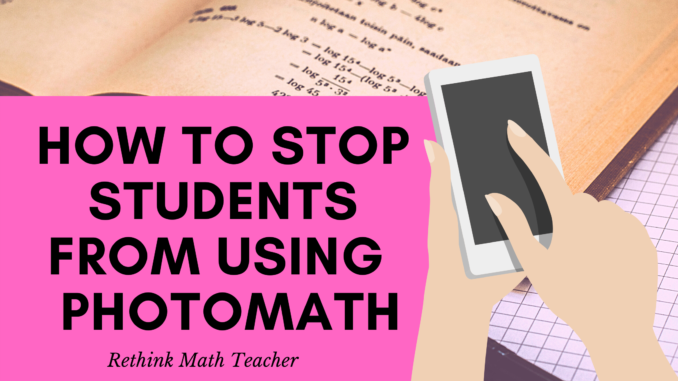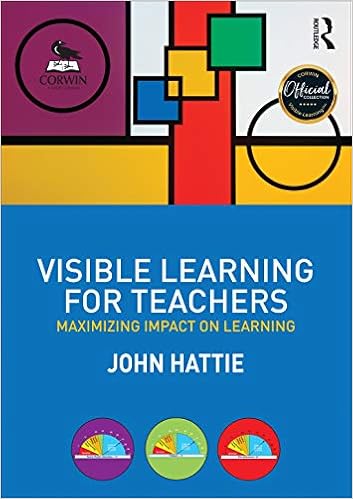
Math teachers are getting more and more frustrated with PhotoMath and other apps that literally do the students’ homework for them.
Just download the app, point your phone’s camera at the picture of the problem in your math textbook, worksheet, or even your handwritten copy of the problem, and viola! Not only will it instantly show you the solution, but it will even show you the step by step work, so you can show that too!
Cheating has never been easier!
Obviously, we all know that cheating is bad. Students will not learn the concept because they’re cheating, and then they will fail the test! They will also struggle with math as it gets progressively more difficult, since they haven’t learned the prerequisite skills needed to do the work – since they were always just pointing their phone camera.
I host the greatest Facebook Group for math teachers and this question comes up repeatedly: How do we create PhotoMath App proof questions so that students can’t cheat on their homework.
There are always a multitude of answers. Suggestions include
- Use emoji’s instead of variables
- Write the problems as words instead of numbers
- Use “i” as the variable
- Use symbols for variables (I’m noticing a theme)
- Use dark backgrounds that you put the problems over
- Show the steps and ask students which step was an error
- Use FlipGrid and watch them work it live
- Have students model one of the homework questions in class
- Short answers instead of solutions
While all of these ideas might work, for now, I promise you that another app (or an upgrade of this one) is coming that will side step all of these attempts. Or, students can just rewrite the problem from the words, or change the emoji’s to letters, and then the app will work just fine.
We will not be able to defeat the rise of technology and the endless opportunities to cheat that come with it.
Here are two solutions I would like to recommend.
Solution 1: Ditch that Homework
The first solution is from Alice Keeler and Matt Miller, authors of “Ditch that Homework.”
For a plethora of reasons that they dive into in their book, they recommend no longer assigning homework to your students. One of the reasons that they present is that homework promotes cheating. And the PhotoMath App is a perfect illustration of just that.
Instead, maximize your time in class, and have your students do their independent work in class, with you there to help them, provide feedback, and make sure no one is using their cell phone!
Method 2: Remediation through Learning Stations
The second solution can be found in Chris Skierski’s book, Reach Them All. Which outlines an instructional delivery method to differentiate your instruction through Skills Based Learning Stations.
In this methodology, Chris assesses his students to see what skill they need to work on. Each student is put into an independently running learning station to develop that skill.
After three days of instruction and practice, students are given a quiz to see if they have mastered the concept they’re working on. If they have, they are promoted to the next skill. If not, they are remediated and remain working on that skill.
By keeping the student on the skill until they master it, cheating is discouraged, because if the student cheats on the independent work, they will not master the quiz (since they bypassed the learning phase).
Immediate Feedback
In the above methedology, Skierski also provides his students with answer sheets or solutions that show the work to EVERY problem that the students work on within the station.
Through this, he further discourages cheating, because the answers are provided. “No need to cheat, no need to use the PhotoMath app, I’ve already given you the answers! I just want you to check them AFTER you do the work, not before. And if you make a mistake, catch it, and fix it, so you learn from it.”
In John Hattie’s book, Visible Learning for Teachers, we learn that the most valuable tool a teacher can use is immediate feedback. This allows students to learn from their mistakes, or gain confidence as they do the work correctly.
Stop Fighting a Losing Battle
Yes, cheating is bad. And students should not do it (nor should adults).
But it’s just too easy these days. So stop fighting a battle you cannot win. Instead, start utilizing some more highly effective teaching strategies.
Hattie’s book also shows us that homework has very little effect on students’ comprehension. So listen to the experts. Instead, focus on immediate feedback, and enough practice repetitions to help your students get it.
Learn More about Learning Stations
To learn more about how Chris differentiates his instruction to reach all of his students, you can read his book, Reach Them All. He also has an online, video-based course that will walk you through the process of creating your own stations to reach your students while providing them with immediate feedback and as much practice repetitions as they need.
You can get the first unit of this online course entirely free by clicking here.










